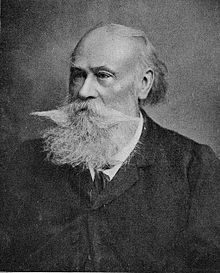Karl Blind
| Karl Blind | |
|---|---|
 |
|
| Personal details | |
| Born |
9 April 1826 Mannheim |
| Died | 31 May 1907 (aged 81) London |
| Nationality | German |
| Signature | |
Karl Blind (4 September 1826, Mannheim – 31 May 1907, London) was a German revolutionist and writer on politics, history, mythology and German literature.
While a student at Heidelberg, he was imprisoned for his revolutionary activity, perhaps in consequence of a pamphlet he wrote entitled "German Hunger and German Princes." During the risings of 1848, he participated in the uprising in the Grand Duchy of Baden led by Friedrich Hecker, and had to flee, wounded. The next year, he joined the band of liberals headed by Gustav Struve which invaded southern Germany. He was taken prisoner and sentenced to eight years' confinement, but after eight months in prison, he was freed by a revolutionary mob while being taken to Mainz. He then went to Karlsruhe, whence he was sent by the provisional government of Baden as an envoy to Paris. Expelled from France, he went to Brussels, and then in 1852 found refuge in England, where he interested himself in democratic movements, and cultivated his literary as well as his political proclivities by contributing to magazines, and otherwise. He maintained an active correspondence with other democratic leaders, like Giuseppe Garibaldi, Giuseppe Mazzini, and Louis Blanc.
Many Europeans expected a unified Germany to become a European and world leader and to champion humanitarian policies. This is demonstrated in the following letter written by Garibaldi to Blind on 10 April 1865:
The progress of humanity seems to have come to a halt, and you with your superior intelligence will know why. The reason is that the world lacks a nation which possesses true leadership. Such leadership, of course, is required not to dominate other peoples, but to lead them along the path of duty, to lead them toward the brotherhood of nations where all the barriers erected by egoism will be destroyed. We need the kind of leadership which, in the true tradition of medieval chivalry, would devote itself to redressing wrongs, supporting the weak, sacrificing momentary gains and material advantage for the much finer and more satisfying achievement of relieving the suffering of our fellow men. We need a nation courageous enough to give us a lead in this direction. It would rally to its cause all those who are suffering wrong or who aspire to a better life, and all those who are now enduring foreign oppression.
...
Wikipedia
